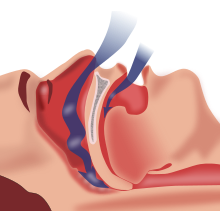This article needs additional citations for verification. (March 2015) |
| Catathrenia | |
|---|---|
 | |
| Specialty | Otorhinolaryngology, sleep medicine, Somnology |
| Symptoms | groaning or moaning during sleep |
Catathrenia or nocturnal groaning is a sleep-related breathing disorder, consisting of end-inspiratory apnea (breath holding) and expiratory groaning during sleep. It describes a rare condition characterized by monotonous, irregular groans while sleeping.[1] Catathrenia begins with a deep inspiration. The person with catathrenia holds his or her breath against a closed glottis, similar to the Valsalva maneuver. Expiration can be slow and accompanied by sound caused by vibration of the vocal cords or a simple rapid exhalation. Despite a slower breathing rate, no oxygen desaturation usually occurs.[2][3][4] The moaning sound is usually not noticed by the person producing the sound, but it can be extremely disturbing to sleep partners.[1] It appears more often during expiration REM sleep than in NREM sleep.[5]
Catathrenia is distinct from both somniloquy (sleep talking) and obstructive sleep apnea (OSA). The sound is produced during exhalation, as opposed to snoring, which occurs during inhalation.
- ^ a b Vetrugno, R.; Lugaresi, E.; Plazzi, G.; Provini, F.; D'Angelo, R.; Montagna, P. (2007-11-01). "Catathrenia (nocturnal groaning): an abnormal respiratory pattern during sleep". European Journal of Neurology. 14 (11): 1236–1243. doi:10.1111/j.1468-1331.2007.01954.x. ISSN 1468-1331. PMID 17877735. S2CID 10742456.
- ^ Okura, Mutsumi; Muraki, Hisae (2013-08-01). "WS1-3. Attended video–audio polysomnographic study about patients with catathrenia (sleep related groaning)". Clinical Neurophysiology. 124 (8): e29. doi:10.1016/j.clinph.2013.02.071. ISSN 1388-2457. S2CID 54382541.
- ^ Iriarte, Jorge; Campo, Arantza; Alegre, Manuel; Fernández, Secundino; Urrestarazu, Elena (2015-07-01). "Catathrenia: respiratory disorder or parasomnia?". Sleep Medicine. 16 (7): 827–830. doi:10.1016/j.sleep.2014.12.026. ISSN 1389-9457. PMID 26004681.
- ^ Montagna, Pasquale; Ferini-Strambi, Luigi; Lugaresi, Elio; Vetrugno, Roberto (2008-03-01). "Catathrenia (Nocturnal Groaning): What is It?". Sleep. 31 (3): 308–309. doi:10.1093/sleep/31.3.308. ISSN 0161-8105. PMC 2276742. PMID 18363305.
- ^ Koo, Dae Lim; Hong, Seung Bong; Joo, Eun Yeon (2012). "Acoustic characteristic of catathrenia and snoring: Different subtypes of catathrenia". Sleep Medicine. 13 (7): 961–964. doi:10.1016/j.sleep.2012.04.002. PMID 22613219.